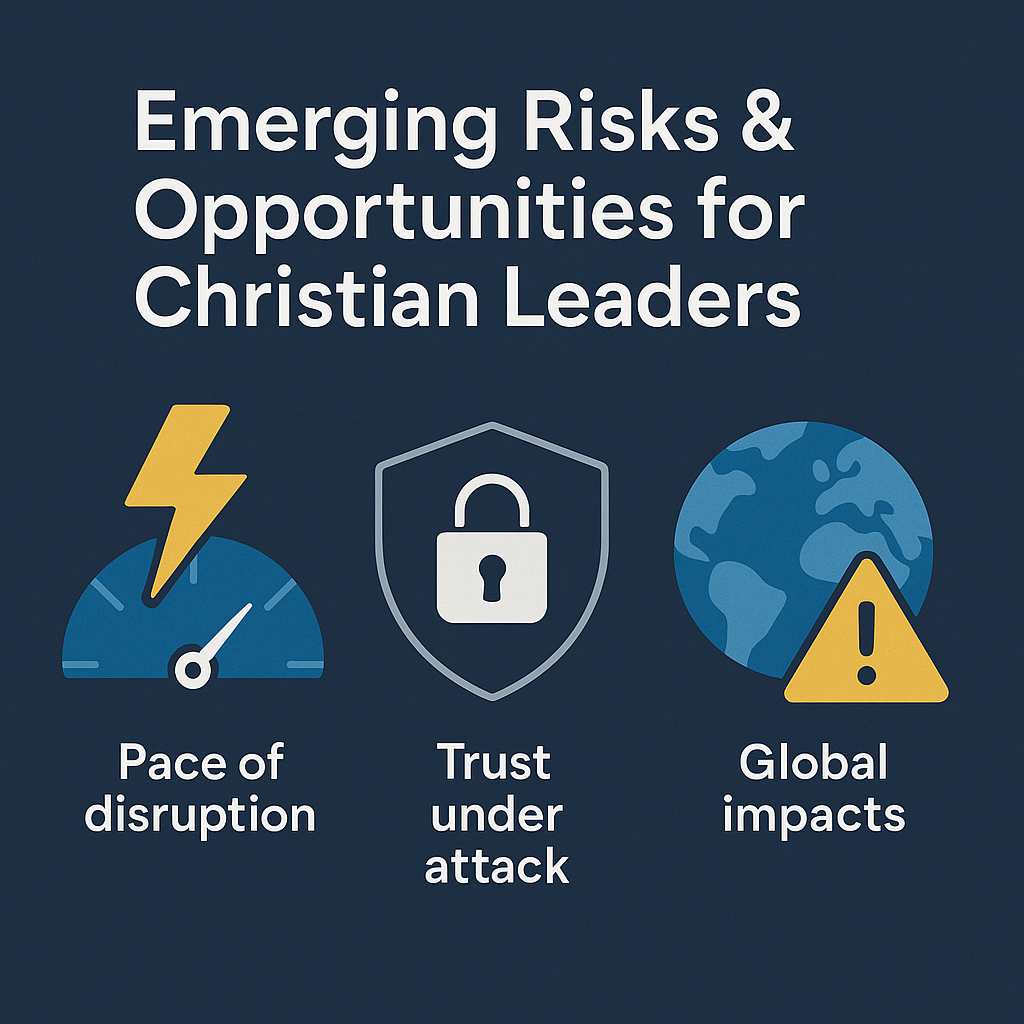Emerging Risks & Opportunities for Christian Leaders
1. The Pace of Disruption
Technology is advancing exponentially, often outpacing ethical frameworks and church readiness. AI adoption is moving from novelty to necessity across industries within 3–5 years. Leaders must anticipate disruption at speed and prepare congregations and organizations for sudden shifts in work, communication, and discipleship.
Opportunity: Proactively train leaders and churches in digital literacy, equipping them to respond with wisdom rather than fear.
2. Trust in a World of Misinformation
AI-driven misinformation, deepfakes, and synthetic voices will challenge truth itself. The ability to discern what is real and what is false will become one of the defining leadership skills of the future.
Opportunity: Christian leaders can reclaim their historic role as truth-tellers, grounding people in Scripture while also teaching digital discernment.
3. Concentration of Power
A small number of corporations currently dominate AI research and deployment. Ethical decision-making is increasingly centralized in profit-driven organizations rather than in communities or governments.
Opportunity: The church can be a voice calling for justice, transparency, and accountability in how technology is governed—advocating for the vulnerable who have no seat at the table.
4. Beyond AI: The Convergence Frontier
AI is only one part of a broader disruption. Bioengineering, brain-computer interfaces, robotics, and human augmentation raise profound questions about identity, embodiment, and what it means to be human.
Opportunity: Christian leaders can speak prophetically about embodiment, the image of God, and the hope of resurrection—offering a vision of human dignity that transcends technological enhancement.
5. Global and Generational Impacts
AI will not impact all equally. In some parts of the Global South, AI could bring educational access and agricultural advances. Yet it may also deepen inequality, displace workers, and exploit vulnerable populations. For Gen Z and Alpha, technology is not an add-on to life but the environment they live in.
Opportunity: The church can champion justice, shape fair adoption of technology, and disciple digital-native generations with practices rooted in presence, prayer, and embodied community.
6. From Personal Ethics to Systemic Design
Personal use of technology matters, but systemic design decisions—bias, accessibility, sustainability, transparency—will shape billions of lives. Christian ethics cannot stop at personal choices but must engage with systemic questions of justice and design.
Opportunity: Encourage Christian professionals in tech, policy, and design to embed biblical principles into the systems they build.
7. Future-Proof Framework for Leaders
Before adopting or endorsing any new technology, Christian leaders can ask three kingdom-focused questions:
Dignity: Does this elevate or diminish the value of people made in God’s image?
Justice: Who benefits, and who is harmed or left behind?
Discipleship: Will this draw us closer to Christ and one another, or lead us into distraction and idolatry?
Contact
If this resonates with you, here are a few ways to take the next step:
Stay Connected – Sign up to receive future postings, reflections, and resources on faith and technology.
Go Deeper – Explore Infinite Worth: Discovering Your Identity in Christ in a Rapidly Changing World for a fuller vision of identity, purpose, and leadership.
Collaborate – If you’re leading in business, ministry, or technology and want to explore this framework in your context, let’s connect.
Together, we can help ensure that technology serves humanity, not the other way around—and that every decision is anchored in Christ, shaping the future, and elevating people.


